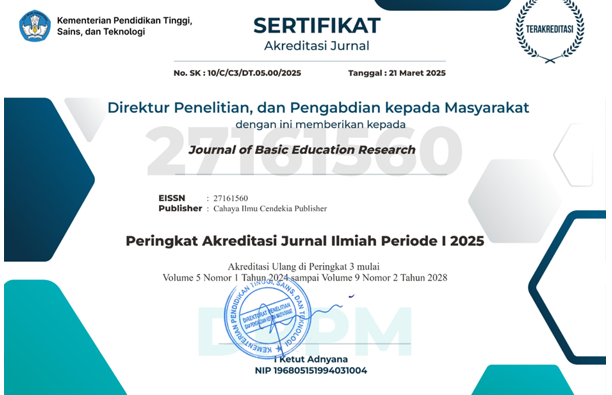A Systematic Literature Review of Raz-Kids in Teaching Reading
Abstract
Purpose of the study: The objective of this study is his study ims to evaluate the effectiveness of Raz-Kids in improving students’ reading skills and investigate the effect of Raz-Kids on students during a reading program.
Methodology: The method implemented in this study was Systematic Literature Review (SLR). There were 16 papers on implementing Raz-Kids in teaching reading from Google Scholar, SINTA, Science Direct, and ERIC. The step in writing this scientific work is to find the sources of previous studies, examine them, and make conclusions based on the subject of the study.
Main Findings: The result showed that Raz-Kids is an effective internet portal that helps students develop reading skills. It also supports students’ enthusiasm and independent learning in reading. The parents and teachers act as support systems to encourage them to achieve their reading goals. However, there are many challenges with Raz-Kids’ use in reading programs. It highlights the need for this portal to be enhanced. Thus, Raz-Kids is a valuable online resource that helps learners develop their reading skills.
Novelty/Originality of this study: This review mainly focused on implementing specific internet portals, namely Raz-kids, in teaching reading in EFL Classes. It aims to develop the knowledge of researchers, educators, policymakers, and technology developers concerning the crucial internet portal Raz-Kids in teaching reading and its effect on students’ outcomes.
References
H. Chen, Y. Zhao, X. Wu, P. Sun, R. Xie, and J. Feng, “The relation between vocabulary knowledge and reading comprehension in Chinese elementary children: A cross-lagged study,” Acta Psychol. Sin., vol. 51, no. 8, pp. 924–934, 2019, doi: 10.3724/SP.J.1041.2019.00924.
M. Cohen, “From killing trees to executing bits: A survey of computer-enabled reading enhancements for evolving literacy,” Proc. 2014 Int. Conf. Virtual Syst. Multimedia, VSMM 2014, pp. 69–76, 2014, doi: 10.1109/VSMM.2014.7136686.
A. Al-Azawei, F. Serenelli, and K. Lundqvist, “Universal design for learning (UDL): A content analysis of peer reviewed journals from 2012 to 2015,” J. Scholarsh. Teach. Learn., vol. 16, no. 3, pp. 39–56, 2016, doi: 10.14434/josotl.v16i3.19295.
L. R. Gay, M. G. E., and P. Airasian, “Educational research: competencies for analysis and applications,” in Pearson, 2019, pp. 1–667.
J. Li, A. Brar, and N. Roihan, “The use of digital technology to enhance language and literacy skills for Indigenous people: A systematic literature review,” Comput. Educ. Open, vol. 2, pp. 1–57, 2021, doi: 10.1016/j.caeo.2021.100035.
S. Kara, “The impact of teacher-generated quizzes of raz-kids in cultivating primary school students’ reading skills,” Arab World English J., vol. 15, no. 4, pp. 110–126, 2024, doi: 10.24093/awej/vol15no4.8.
M. F. F. Nurohman Dede, Abd Aziz, “Teachers’ support in developing reading skills: A systematic literature review,” J. Nusant. Stud., vol. 10, no. 01, pp. 239–273, 2025.
S. J. M. Shahrol, S. Sulaiman, M. R. Samingan, and H. Mohamed, “A systematic literature review on teaching and learning english using mobile technology,” Int. J. Inf. Educ. Technol., vol. 10, no. 9, pp. 709–714, 2020, doi: 10.18178/ijiet.2020.10.9.1447.
C. Pinho, M. Franco, and L. Mendes, “Web portals as tools to support information management in higher education institutions: A systematic literature review,” Int. J. Inf. Manage., vol. 41, pp. 80–92, 2018, doi: 10.1016/j.ijinfomgt.2018.04.002.
G. Damayanti, C. W. Nawangsih, E. F. Hasna, and N. Sopyawanda, “Systematic literature review: The effectiveness of quizizz application as tool for reading assessment in senior high school,” in Proceeding of Conference on English Language Teaching (CELTI 2022), 2022, pp. 168–181. doi: 10.24090/celti.v2.45.
S. B. Hartmann, L. Q. N. Braae, S. Pedersen, and M. S. Khalid, “The potentials of using cloud computing in schools: A systematic literature review,” Turkish Online J. Educ. Technol., vol. 16, no. 1, pp. 190–202, 2017.
P. M. I. Seraj and A. Rahmatullah, “Systematic literature review on the use of applications of smartphones for teaching English in EFL contexts,” J. English Educ. Teach., vol. 6, no. 3, pp. 347–366, 2022, doi: 10.33369/jeet.6.3.347-366.
G. Lame, “Systematic literature reviews: An introduction,” in Proceedings of the International Conference on Engineering Design, ICED, 2019. doi: 10.1017/dsi.2019.169.
R. Thorpe, R. Holt, L. Pittaway, and A. Macpherson, “Using knowledge within small and medium-sized firms: A systematic review of the evidence,” Int. J. Manag. Rev., pp. 1–56, 2005, doi: 10.1111/j.1468-2370.2005.00116.x.
A. Liberati et al., “The PRISMA statement for reporting systematic reviews and meta-analyses of studies that evaluate health care interventions: Explanation and elaboration,” PLoS Med., vol. 6, no. 7, pp. 1–28, 2009, doi: 10.1371/journal.pmed.1000100.
L. Pittaway and J. Cope, “Entrepreneurship education: A systematic review of the evidence,” Int. Small Bus. J., vol. 25, no. 5, pp. 479–510, 2007, doi: 10.1177/0266242607080656.
M. Petticrew and H. Roberts, Systematic Reviews in the Social Sciences: A Practical Guide. 2008. doi: 10.1002/9780470754887.
G. Iskandarova and Г. Іскандарова, “Using innovative reading programs in preschool age and their impact on child development,” Presch. Educ. Glob. Trends, vol. 5, pp. 63–75, 2024, doi: 10.31470/2786-703x-2024-5-63-75.
K. E. Rose, “RAZ for All ! Exploring the effects of a digital reading app in an EFL vlass,” 教職センター年報, pp. 18–34, 2022.
S. K. Bijay and S. B. Sathiasilan, “Effectiveness of incorporating a structured e - books programme to improve the outcomes for early struggling readers,” Asia Pacific J. Dev. Differ., vol. 10, no. 2, pp. 289–310, 2023, doi: 10.3850/S2345734123001198.
Z. S. Al-Riyami and S. S. H. Al-Siyabi, “Using raz-kids reading program to enhance fifth grade efl omani students’ reading comprehension skills and boost their motivation,” J. Curric. Teach. Methodol., vol. 3, no. 10, pp. 93–103, 2024.
B. Celik and S. Kara, “Perceptions of parents on raz-kid’s role in enhancing students’ micro and macro-skills holistically: A study on ishik brayaty international primary school in Erbil,” Forum Linguist. Stud., vol. 6, no. 3, pp. 558–573, 2024, doi: 10.30564/fls.v6i3.6822.
P. Amelia, D. Rukmini, J. Mujiyanto, and D. A. L. Bharati, “TPACK goes to fourth grade: Lessons from learning English through Raz Kids program,” Adv. Soc. Sci. Educ. Humanit. Res., vol. 443, pp. 401–405, 2019, doi: 10.2991/assehr.k.200620.078.
S. Frances, “Use of online extensive reading: Effect one english language proficiency and student attitudes to reading in English,” J. Fac. Lett., vol. 3, no. 5, pp. 29–41, 2016.
S. Kara, “The Impact of Teacher-generated Quizzes of Raz-Kids in Cultivating Primary School Students’ Reading Skills,” Arab World English J., vol. 15, no. 4, pp. 110–126, 2024.
A. Alowais, “The effects of leveled reading on second language learners,” Int. J. Res. Innov. Soc. Sci., vol. 7, no. 4, pp. 1281–1299, 2021, doi: 10.47772/ijriss.2021.5627.
A. R. Winans, “Swipe , tap , and read : Research on e-book tools , features , and student engagement,” 2016.
A. Marchand, “Using the raz-kids reading program to increase reading comprehension and fluency for students with LD,” 2015.
M. Resendez and M. Azin, “Raz-kids and reading A-Z : A report on the 2013 summer reading field studies,” 2014.
D. Holder, Raz-Kids an evaluation of an online reading program prepared for second grade teachers at Starlight Elementary School. 2015.
H. Carroll, “Will the use of Raz-Kids during independent reading time improve third grade students’ reading attitude and comprehension?,” 2013.
Learning A-Z, Case study: Ohio, rittman exempted village school district. 2020.
Learning A-Z, Case study: Wisconsin, milwaukee public schools. 2020.
W. Magnano and C. Nunes, “The use of digital resources to enhance literacy,” Sci. Connect. Interdepend. Discip., 2001, doi: 10.1007/978-1-4939-6911-1.
J. S. Suing, “The effects of marzano’s six step vocabulary process, on fourth grade students’ vocabulary knowledge, fluency, and sentence complexity,” 2012.
N. P. Rickert and E. A. Skinner, “Parent and teacher involvement and adolescent academic engagement: Unique, mediated, and transactional effects,” Int. J. Behav. Dev., vol. 48, no. 1, pp. 71–84, 2024, doi: 10.1177/01650254231210561.
L. Costache, S. Cojocaru, D. Cojocaru, and O. Bunea, The Benefits of Parenting Education in the School System. the Impact of Parenting Education on School Culture and School Participation. 2025. doi: 10.33788/qie.25.01.
S. Palmer, “Current issues & limitations in using the Internet for teaching & learning,” Aust. Educ. Comput., vol. 13, no. 1, pp. 12–17, 1998.
C. Spencer, “Research on learners ’ preferences for reading from a printed text or from a computer screen,” J. Distance Educ., vol. 21, no. 1, pp. 33–50, 2006.
C. Spencer, “Research on Learners ’ Preferences for reading from a printed text or from a computer screen,” J. Distance Educ., vol. 21, no. 1, pp. 33–50, 2006.
M. R. Patra and A. R. Dash, “Accessibility analysis of some indian educational web portals,” Int. J. Comput. Sci. Eng. Appl., vol. 7, no. 3/4, pp. 41–55, 2017, doi: 10.5121/ijcsea.2017.7404.
S. V. Jadhav, P. Jain, Y. Bhansali, S. Jain, and D. Jain, “Adaptive and automated assessment system to decide the difficulty level of questions,” in Proceedings - 2018 4th International Conference on Computing, Communication Control and Automation, ICCUBEA 2018, IEEE, 2018, pp. 1–4. doi: 10.1109/ICCUBEA.2018.8697433.
L. L. MacQuarrie, “A comparison of the incremental rehearsal method, the pocket word method, and repeated reading in instructional-level text on the word retention, words read per minute, and comprehension of first-grade,” 2012.
M. A. Parenti, “Motivating struggling middle school readers: Digital images as an aid for self-monitoring and enhancing retellings of text,” i-manager’s J. Educ. Technol., vol. 13, no. 1, pp. 1–6, 2016, doi: 10.26634/jet.13.1.6013.
Copyright (c) 2025 Amelia Widihastutik

This work is licensed under a Creative Commons Attribution 4.0 International License.
Authors who publish with this journal agree to the following terms:
- Authors retain copyright and acknowledge that the Journal of Basic Education Research is the first publisher licensed under a Creative Commons Attribution 4.0 International License.
- Authors are able to enter into separate, additional contractual arrangements for the non-exclusive distribution of the journal's published version of the work (e.g., post it to an institutional repository or publish it in a book), with an acknowledgment of its initial publication in this journal.
- Authors are permitted and encouraged to post their work online (e.g., in institutional repositories or on their website) prior to and during the submission process, as it can lead to productive exchanges and earlier and greater citation of published work.





.png)


.png)
.png)


















